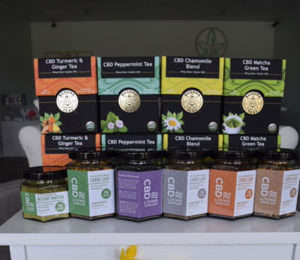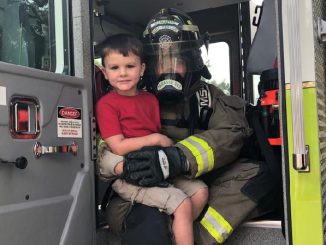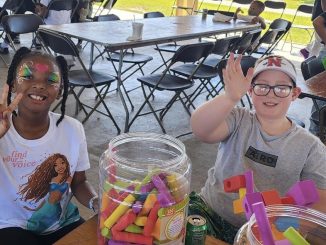
2 CBD stores have recently opened in St. Charles Parish
The customers coming to The CBD Store in Destrehan are looking for the health benefits of hemp’s cannabidiol oil, not its psychotropic THC, says store owner Craig Jacomine.
“The people who come in our store are not stoners or drug addicts,” Jacomine said. “We’ve never had that one time and other CBD store owners say the same thing. The ones who come in our stores are retired, in pain a long time, people who take three pain pills in the morning, lunchtime and at bed whom want to stop this from taking over their life.
“They come well researched and know what we have. They come for kids with sleeping issues or ADHD (Attention Hyperactivity Deficit Disorder). It’s unreal.”
CBD or cannabidiol was discovered in 1940 as a plant extract with studies on its benefits including combating anxiety, epilepsy, movement disorders and pain. The extract can have trace to zero amount of THC.
The ballooning national demand for CBD has reached St. Charles Parish with two stores that opened in February.
Jacomine and Brandy Nichols, owner of Kaya’s CBD Retreat in Luling, both say they opened their businesses because an increasing number of customers coming into their vape stores were also asking for CBD.
But Sheriff Greg Champagne called CBD regulation a complex issue where THC remains an illegal substance in Louisiana. However, the federal government allows .3 percent or less THC in CBD products.
“I would caution anyone looking to sell CBD/hemp oil or such products to be certain that they do not contain any THC,” Champagne said. “I’m not sure how they can be assured of this, but that is what they need to do. In the meantime, the SCPSO will handle any suspicious substance we come across the same as we always have – with a preliminary field test and subsequent lab test. Of course, in any such situations, we will act in accordance with the Fourth Amendment and probable cause.”
Out of caution, both Jacomine and Nichols opened CBD stores separate from their vape stores and stocked them with third-party tested items. Shortly after opening them, they also were both approached by the St. Charles Parish Sheriff’s Office. The Sheriff’s Office closed them down for about two weeks while they verified the products sold there did not have THC and then allowed both to reopen.
Champagne said the market for CBD expanded when the federal Farm Bill of 2018 removed hemp from the Schedule 1 Controlled Dangerous Substances list.
“Marijuana and hemp are both plants in the cannabis family,” he said. “While they smell and appear similar, there are differences, most importantly that hemp plants contain a much lower amount of THC than does marijuana.”
The Farm Bill defines hemp as cannabis that contains a level of THC at or less than .3 percent. THC is the abbreviation for tetrahydrocannabinol, which is the psychoactive ingredient found in both hemp and marijuana – in other words the chemical that causes the “high.”
Typically, hemp plants contain no more than .3 percent THC, which is much lower than that of marijuana that can range from 15 to 30 percent.
The Farm Bill of 2018, however, only affects federal law.
But Champagne emphasized THC is still an illegal Schedule 1 substance at any level in Louisiana, which means “any oil or hemp product that has any level of THC is illegal in Louisiana.”
“Many entrepreneurs mistakenly rushed into the CBD oil business believing it was totally legal everywhere if it contained less than .3 percent THC,” he said. “This is not correct.
The Louisiana Legislature passed legislation in the last couple of years that authorized “medical marijuana” or “cannabinoid derivative product” that can only be produced under the direction and supervision of LSU and the Commissioner of Agriculture and must be in pill or oil form, Champagne said. “This process has not been completed nor has any such product been approved for sale to the public.”
The sheriff said the Legislature is considering two bills that he’s aware of that would legalize hemp and/or oil with a THC level of .3 percent or less.
“We should all know whether that happens within the next 60 days,” he said. “Such legislation would also cause further confusion and be possibly in conflict with the already existing ‘medical marijuana’ legislation already passed.”
In the meantime, Jacomine and Nichols are responding to a ballooning demand for the CBD extract, which has been connected to a multitude of health benefits ranging from easing epilepsy seizures to reducing anxiety.
An estimated 7 percent of Americans are using the extract, making it a $2 billion market in sales. At the current rate of use, this figure is expected to reach $16 billion by 2025.
The FDA has scheduled a May 31 meeting to address growing concerns about false claims and potential impurities of CBD.
“It’s a kind of a gray area,” Jacomine said of the medicinal claims associated with CBD.
But he considers himself and his family among his best testimonials for its use.
His wife successfully used it to ease pain from back surgery, his mother used it to ease pain from a broken arm that allowed her to sleep, and he maintained it lowered his cholesterol, Jacomine said. It’s what got him into the CBD business.
How the oil is refined determines its level of CBD while eliminating even trace amounts of THC, Jacomine said.
Yet, its use remains chaotic.
Texas recently removed hemp from its controlled substances list. But truck drivers have been arrested carrying hemp from where it’s legal to other states still restricting it.
In their local stores, Jacomine and Nichols say they’ve taken measures to ensure the products they sell are what they say they are and medically beneficial.
Nichols said she offers “a natural alternative for those looking to get away from opioids or any other pharmaceuticals that have negative effects.”
Jacomine added, “I’ve had people come in the store and within 15 minutes their back pain diminished drastically. They were thanking me. We do a word-of-mouth business. People come in buying something for their mom or dad or people with MS or Parkinson’s disease. Lupus is a big one. We do have people that come in and have tried different marijuana products, but they don’t like the way it makes them feel so they use CBD products.”
Beware products sold online, he added. “Online is too good to be true. It’s probably not a good product,” Jacomine said.
To ease concerns, companies that make Charlotte’s Web and MedTerra products, which are among the most popular CBD offerings, now let customers use scan codes to get test results on the items. Visit their website to enter the product number and get results.
Jacomine said the Hemp Roundtable has been working with these companies to set standards for these products.
“As a business owner, I want people to research what they’re looking for and get something that suits them best,” he said. “It’s also up to us to put quality products on our shelves because people trust us.”

- Proponents say it can be used to treat anxiety disorders, PTSD, addiction, arthritic, chronic plan and other conditions. Researchers are also using CBD to lessen seizures and treat those with epilepsy.
- CBD sales hit $6 billion this year.
- Congress legalized hemp and CDB in December.




Mr. Jacomine:
Do you have any information as to whether or not this has any beneficial effect on people who have essential tremor?
Thank you.